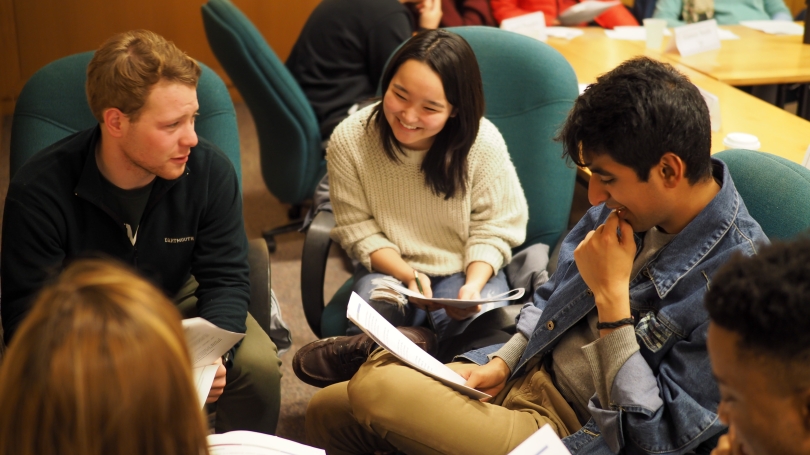
- Public Policy
- Leadership
- Funding
- News & Events
- About the Center
Back to Top Nav
Back to Top Nav
Back to Top Nav
Back to Top Nav
Monday, January 8th, 2018 marked the first session of the 2018 Winter Rockefeller Global Leadership Program (RGLP). As student program assistants, we always enjoy watching the new cohort meet one another for the first time, and this term’s group seemed particularly excited. We have 26 participants of various cultural backgrounds, all eager to explore their conceptions of culture and develop their leadership skills.
After a delicious dinner catered by Jewel of India, the session began with a welcome from Sadhana Hall, Deputy Director of the Rockefeller Center. Sadhana explained the intent of RGLP to bring a global dimension to the Rockefeller Center’s leadership and public policy mission. By the end of this introduction, it was time to get people moving and talking, so the entire group shifted to the Hinman Forum for an icebreaker activity that focused on the group getting to know each other a bit better.
This term’s first guest speakers were Amy Newcomb and Casey Aldrich. Amy and Casey work at the John Sloan Dickey Center for International Understanding and bring a unique perspective on intercultural awareness through their professional and personal experience. Amy and Casey laid the foundation upon which RGLP will build by walking the cohort through a series of activities that were meant to generate a better understanding of what it means to be culturally competent and, by extension, globally minded.
One of the most popular activities from this session was the first one in which participants were charged with finding a partner who shared seven or more differences. As the room buzzed with activity, we noticed a number of pairs painstakingly trying to find seven distinct identity differences with their partners. This activity served a dual purpose; it demonstrated that we might actually have more in common with the people walking around campus than it seems, while also reminding us that we are each individually unique. In doing so, this activity reminded the cohort to appreciate the unique and shared identities within the group. Moreover, we appreciated the reminder that in all of our unique identities, there can be several commonalities shared between complete strangers.
We also spent a significant amount of time talking through the various levels of intercultural awareness set forth by the Intercultural Development Inventory (or IDI). The IDI is a framework that describes the different levels of cultural awareness. A diagnostic test exists that allows the test-taker to discern where they fall on the cultural competence continuum. The five levels on the continuum are denial, polarization, minimization, acceptance, and adaptation. The framework generated thought-provoking conversations about what it means to be culturally aware and how being on the monocultural mindset end of the spectrum can impact the people around us.
Our hope for the 18W cohort is that we will keep this session in mind as we move forward and that we will collectively take the time to reflect on where we might be on the continuum. One of the most under-valued skills of our time is self-reflection. Throughout the term, we hope to find ourselves meditating on our weekly sessions and thinking about how we can apply our weekly topics to our lives at Dartmouth and beyond.
Written by Sydney Latimore and Peter Blum, RGLP Student Program Assistants